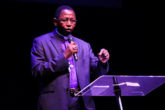
Isaias Afwerki, a Habesha of Tigrinya ethnicity, is the current President of Eritrea. He has held the position since Eritrea`s independence in 1993
Eritrean authorities have ordered the seizure of all Church-managed health centres, Uganda Christian News has learnt.
In a letter to the ministry of health, the Church said patients were ordered to go home, and soldiers were deployed to the centres to guard them.
“The seizure of these health facilities will negatively impact the right to health of the affected populations, in particular those in remote rural areas,” United Nations special rapporteur Mr Daniela Kravetz spoke out on the situation of human rights in Eritrea.
According to the UN, The Catholic Church in Eritrea manages some 40 hospitals and health centres, mainly in rural areas and some inside monasteries. Most provide free services, and many have operated since the 1990s.
“By curtailing the activities of the Catholic Church, the Eritrean authorities are restricting the right of their citizens to enjoy quality health care,”
Mr Daniela Kravetz said.
According to the BBC, analysts believe the seizures were retaliatory, after the Church in April called for reforms to reduce emigration. The bishops had also called for national reconciliation.
UN’s Kravetz also received reports that on 13 June, security forces arrested five Orthodox priests from the Debre Bizen monastery, three over 70 years old, for opposing Government interference in Church affairs.
And last month, she received reports that the Eritrean authorities arrested Christians for practicing their faith.
On 17 May, around 30 Pentecostal Christians were reportedly arrested during prayer meetings at different locations in Godeif, south of the capital Asmara.
A week earlier, during a private gathering in the Mai Temenai district of Asmara, reportedly some 141 Christians were arrested, including 104 women and 14 children. Some were reportedly taken to Adi Abeito prison, while others were held by the police. About 50 of the detained have since been released while those remaining are being held without charge, according to reports.
Ms. Kravetz stressed that arresting individuals for peacefully exercising their right to freedom of religion and belief is a clear violation of Eritrea’s obligations under international human rights law, recalling that freedom of religion is central to the ability of Eritreans to live together peacefully.
The UN envoy will share her findings on the situation during an interactive dialogue scheduled for 2 July at the Human Rights Council in Geneva.
“I urge Eritrea to live up to its international commitments as a member of the Human Rights Council and allow religious institutions to operate freely and all Eritreans to exercise their right to freedom of religion within the country”, concluded the Special Rapporteur.
In its letter seen by the BBC, the Church said the social services it provided to Eritreans could not be construed as an act of “opposing the government”.
“The government can say it doesn’t want the services of the Church, but asking for the property is not right,” the letter added.
Roman Catholics make up about 4% of Eritrea’s population.
The Church is only one of four religious groups allowed to operate in Eritrea, along with the Eritrean Orthodox, Evangelical Lutheran and Sunni Islam groups.
The government regards other religious groups as instruments of foreign governments.
Eritrea is ranked seventh on the Open Doors World Watch List of countries where Christians suffer the worst persecution for their faith.

